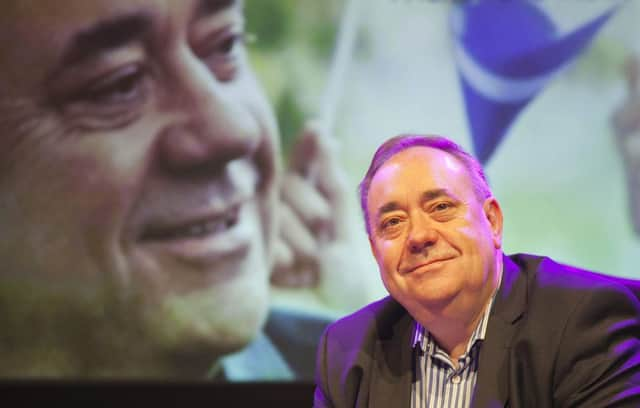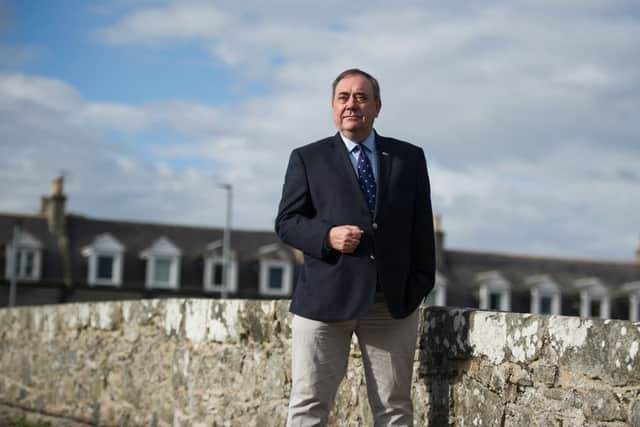Alex Salmond was SNP's most successful leader


Mr Salmond - who strongly denies the claims - made the shock announcement on social media.
His decision to leave the party he joined some 45 years ago comes four years after he stood down as Scotland’s first minister and SNP leader.


Advertisement
Hide AdAdvertisement
Hide AdAfter winning an unprecedented majority at Holyrood in the 2011 Scottish elections, Alexander Elliot Anderson Salmond led the SNP during the 2014 referendum campaign - which saw Scots vote by 55 per cent to 45 per cent to keep the country in the UK.
Soon after the result of that ballot was known, Mr Salmond stood down as party leader and first minister.
At the time of his resignation - the second time he had quit the post of SNP leader - he insisted that “the campaign continues and the dream will never die”.
He had first become SNP leader in 1990, and stayed in the role for ten years, during which time the devolved Scottish Parliament was established.
Mr Salmond, already the MP for Banff and Buchan, went on to win the corresponding seat in the first Holyrood elections in 1999, when his SNP group formed the main opposition to the Labour/Liberal Democrat coalition.
He stood down as SNP leader in 2000, but returned to the post in 2004, despite having initially refused to put himself forward.
At the time he famously quoted Union Army General William Sherman, who, on being asked to run for president following the American Civil War, declared: “If nominated I’ll decline. If drafted I’ll defer. And if elected I’ll resign.”
However, he later changed his mind and ran on a joint ticket with Nicola Sturgeon as candidate for depute leader.
Advertisement
Hide AdAdvertisement
Hide AdThe pair were duly elected to lead the SNP in 2004, and three years later they took the party into power at Holyrood, with 47 MSPs to Labour’s 46.
A spell in minority government followed, but in 2011 the SNP went on to win 69 of the 129 seats in the Parliament, the most any party has ever won and giving them an overall majority.
The 2014 independence campaign marked a high point in Mr Salmond’s political career, with one poll shortly before the referendum indicating a narrow majority of Scots could vote to end the Union.
However, the overall result also sparked his resignation as SNP leader for the second time and ended his tenure as Scotland’s longest-serving first minister, after having held the role for seven years.
He remained on the backbenches at Holyrood, and also made a return to Westminster in the 2015 general election, winning the Gordon constituency as the party - now led by Ms Sturgeon - won a stunning 56 of the 59 seats up for grabs in Scotland.
He stood down from Holyrood the following year, and in 2017 he lost his Westminster seat, as Ruth Davidson’s Scottish Conservatives enjoyed a number of big wins in the snap general election.
While he said quitting the SNP would prevent “substantial internal division” in the party, Mr Salmond also made clear his “absolute intention” to rejoin it “just as soon as I have had the opportunity to clear my name”.
The move is the latest drama in his long political career, which saw him expelled from the SNP briefly for his involvement in the left wing faction of the party known as the “79 Group” and also barred from the Commons for a week after he interrupted the then chancellor’s Budget speech.
Advertisement
Hide AdAdvertisement
Hide AdNow 63, the former politician was born in Linlithgow, West Lothian, and studied at the town’s Linlithgow Academy before going on to study at St Andrews University, where he joined the SNP in 1973.
Despite losing his Westminster seat in 2017 he remained a prominent figure in the SNP.
After being ousted as an MP he went on to host a sell-out chat show at the Edinburgh Festival Fringe, although he faced controversy when he took the Alex Salmond Show onto television on the Russian state-backed channel, RT.
